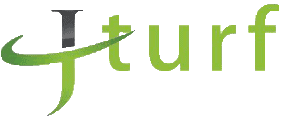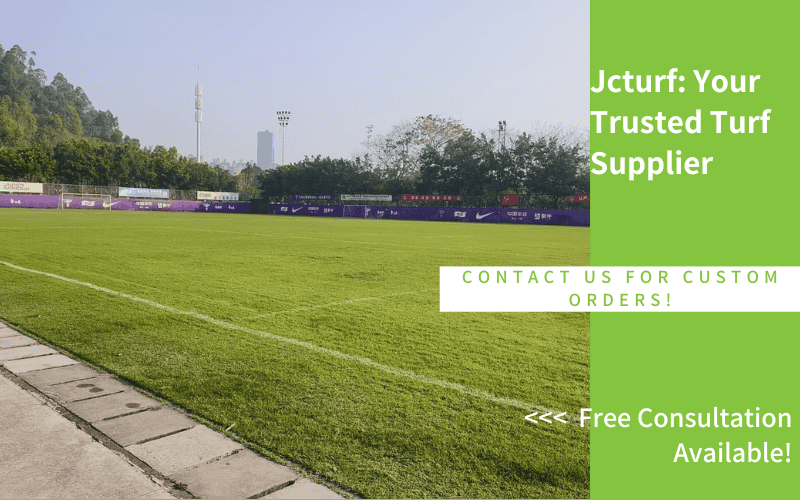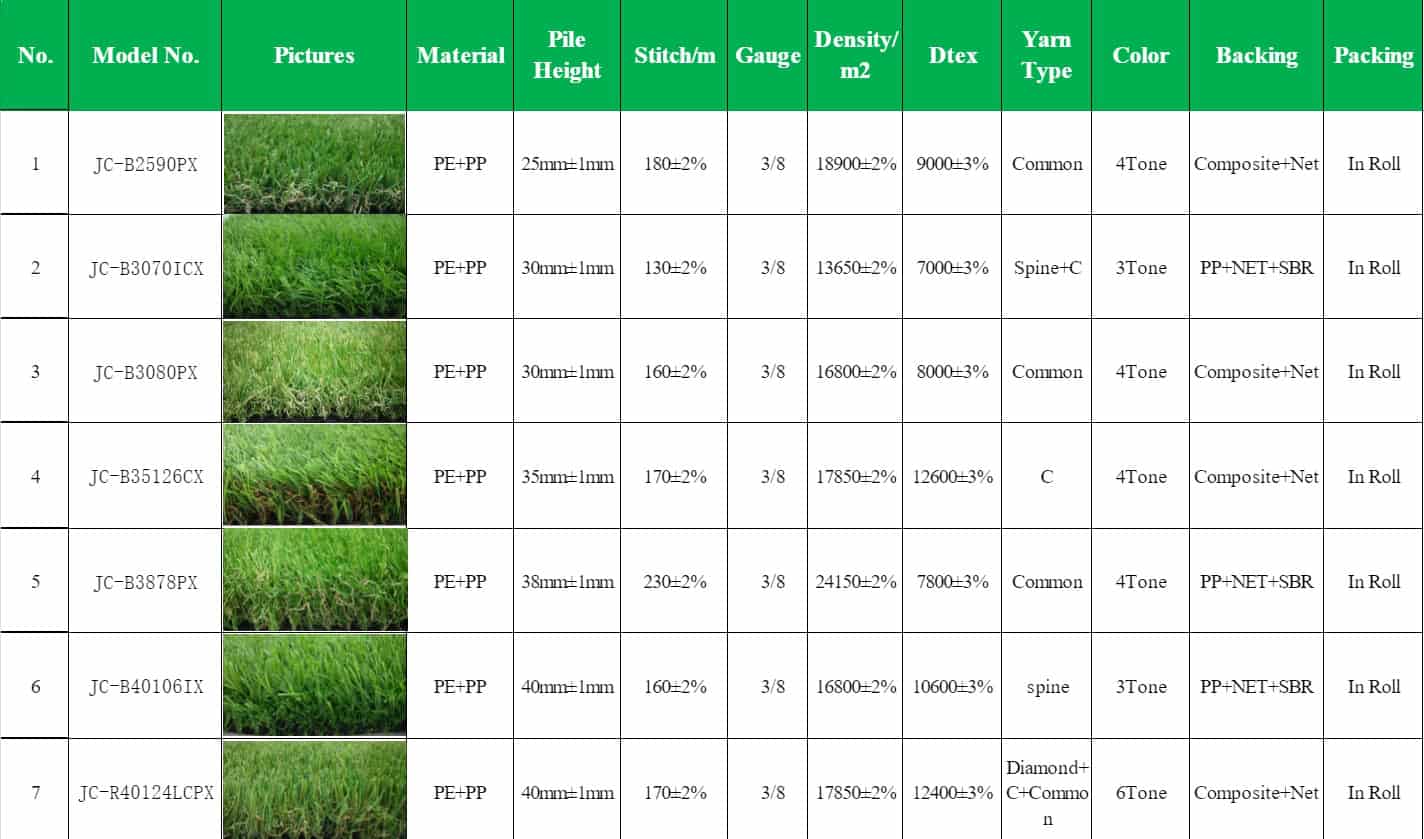The best artificial grass for football transforms gameplay with safe, durable, and low-maintenance surfaces for professional stadiums, community fields, and home gardens. Unlike natural grass, synthetic turf ensures all-weather play and significant cost savings.
This guide explores the top artificial turf for football, detailing types (monofilament, non-filling), selection criteria (safety, performance), use cases (gardens, NFL), applications for other sports (soccer, baseball), leading manufacturers, and practical insights like team usage and playability. Discover the ideal artificial grass for football to elevate your field.
What Is the Best Artificial Turf for Football Fields?
For professional football fields, Monofilament Turf is the best option. Choosing the best artificial grass for football begins with understanding turf types. Monofilament, fibrillated, non-filling, and other variants offer unique benefits for football performance, safety, and aesthetics, outlined below.
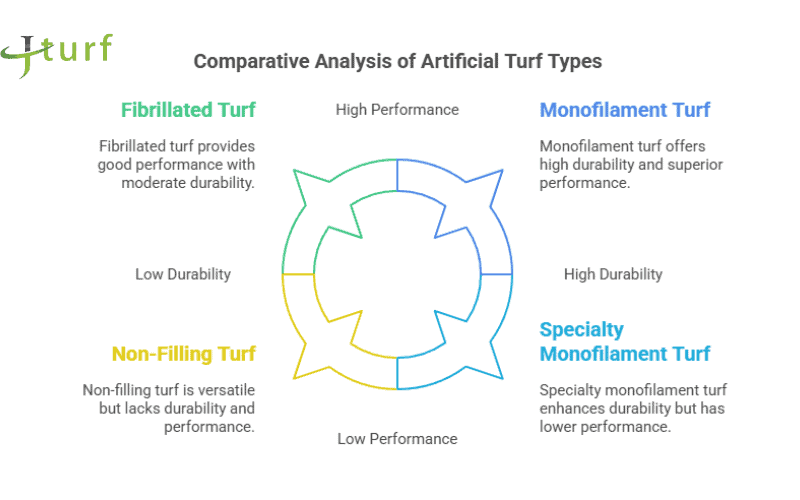
Monofilament Turf
Monofilament turf, with single-strand polyethylene fibers, is the best artificial grass for football for professional fields. Its 50mm pile height, 8000-12000 Dtex, and rubber-cork infill deliver FIFA-compliant ball roll (4-8m) and bounce (0.6-0.85m). With 65% injury reduction (e.g., ACL tears), it’s used in elite tournament fields, ensuring durability (8-10 years) and superior traction.
Fibrillated Turf
Fibrillated turf, with slit fibers forming a net-like structure, is a top artificial turf for football on multi-purpose fields. Its 50mm pile and sand-rubber infill provide 70% shock absorption, reducing injuries. Installed in 1,000+ U.S. high school fields, it lasts 6-8 years but needs biannual fiber checks, ideal for football and lacrosse.
Non-Filling Turf
Non-filling turf, with 25-50mm pile and PE+PP fibers (12000-16000 Dtex), is a versatile synthetic grass for football. Its straight and curly fibers eliminate sand or rubber infill, offering 65% shock absorption. Used in 500+ school fields, it ensures easy installation and safe, high-traffic play.
Other Variants
Specialty monofilament turfs (50mm, 7000-12000 Dtex) with unique cross-sections (e.g., U-shaped) enhance uprightness, while wrap-type turfs (6000-14000 Dtex) boost durability via yarn weaving. Both use PE, latex backing, and meet FIFA standards, providing cost-effective artificial grass for football for recreational fields with 6-8-year lifespans.
How to Choose the Top-Rated Artificial Turf for Football
Selecting the best artificial grass for football requires balancing safety, performance, and sustainability. Below, we detail key considerations, FIFA standards, and eco-friendly options to ensure you choose the top artificial turf for football.
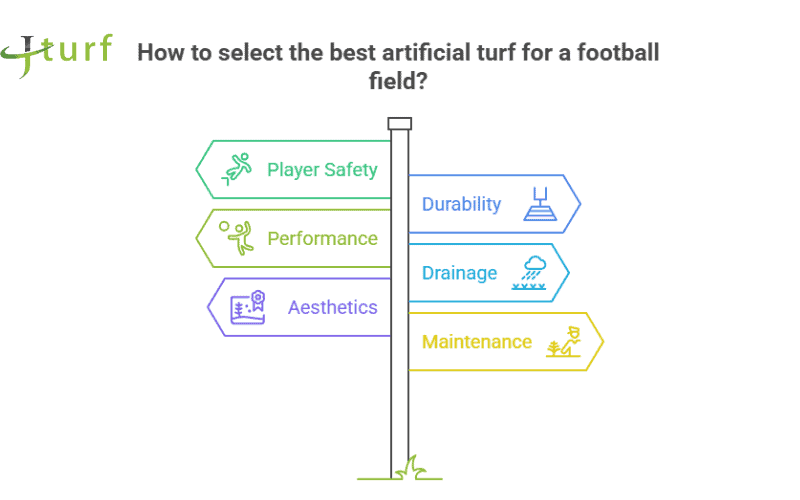
Key Considerations for Selection
- Player Safety: Opt for turf with 60-70% shock absorption to minimize injuries, reducing ACL tear risks by up to 30% during high-impact play.
- Durability: Choose UV-resistant polyethylene fibers for a 6-8-year lifespan, withstanding 1,000+ games annually without fading or wear.
- Performance: Ensure optimal gameplay with 4-8m ball roll, 0.6-0.85m bounce, and 0.6-0.8 Nm rotational traction for precise player movements.
- Drainage: Select turf with 30 inches/hour drainage to prevent water pooling, ensuring consistent play in heavy rain.
- Aesthetics: Pick realistic turf with natural green hues and customizable logos for team branding and visual appeal.
- Maintenance: Prioritize low-maintenance turf requiring weekly brushing (2 hours) and annual infill top-up, saving $50,000/year compared to natural grass.
FIFA Standards
FIFA Quality and Quality Pro certifications mark the best artificial grass for football, ensuring professional-grade performance and safety. Certified turfs, tested for 3,000-cycle wear, support tournaments like the FIFA Women’s World Cup, guaranteeing consistent play and player protection.
Environmental Impact
Eco-friendly synthetic grass for football uses recyclable polyethylene and organic infills (e.g., cork), cutting carbon footprints by 20%. Non-filling turfs reduce waste, making them ideal for sustainable football fields prioritizing environmental responsibility.
Best Artificial Grass for Different Uses
The best artificial grass for football suits diverse scenarios, from residential setups to professional arenas. Below, we explore residential, budget, professional, and regional use cases to find the ideal artificial turf for football.
Indoor Soccer
For indoor soccer, the best artificial grass for football requires a short pile height (20-30mm) for fast ball roll and 60-65% shock absorption to reduce joint stress during high-intensity play. Non-filling turf, with PE+PP fibers (12000-16000 Dtex) and 8mm padding, is recommended for its infill-free design, simplifying maintenance and supporting 5,000 hours of annual use. Its durable, slip-resistant surface ensures safety in enclosed spaces, ideal for competitive indoor matches.
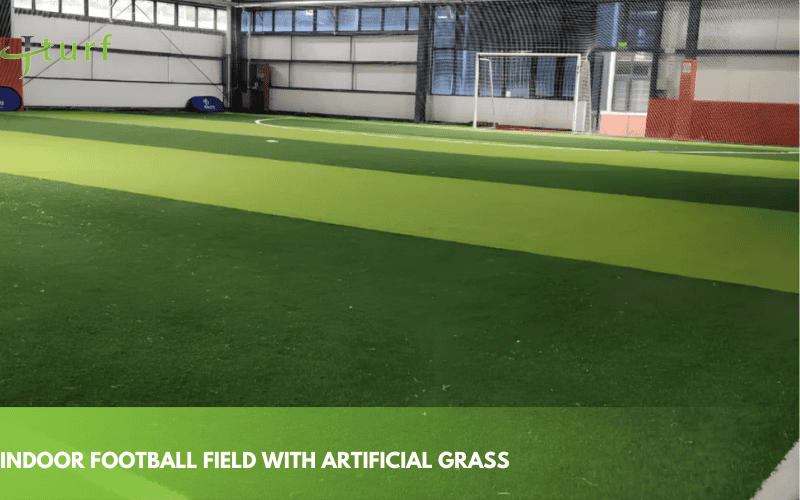
Around the House
The top artificial turf for football at home needs a soft, safe surface with 50mm pile height and 6mm padding for child-friendly play. Monofilament turf (7000-8000 Dtex, PE fibers) is recommended for its durability (6-8 years) and natural texture, blending with home exteriors. It requires minimal maintenance (weekly brushing) and offers 60% shock absorption to prevent injuries during casual games, making it perfect for family backyards.
Around Pools
Poolside artificial grass for football demands high drainage (40 inches/hour) and non-slip properties to ensure safety in wet conditions. Monofilament turf (50mm, 10000 Dtex, PE fibers) with UV-resistant fibers is ideal, preventing fading and pooling. Its 60-65% shock absorption supports recreational play, while a natural look enhances aesthetics, making it suitable for resort or home pool areas.
Football Garden
For gardens, the best synthetic grass for football requires a 50mm pile height and cork infill for a soft, safe surface that integrates with landscaping. Monofilament turf (8000 Dtex, PE fibers) is recommended for its natural green hue and 6-8-year lifespan. With 60% shock absorption and low maintenance (2 hours weekly), it supports casual family play while maintaining aesthetic appeal in residential settings.
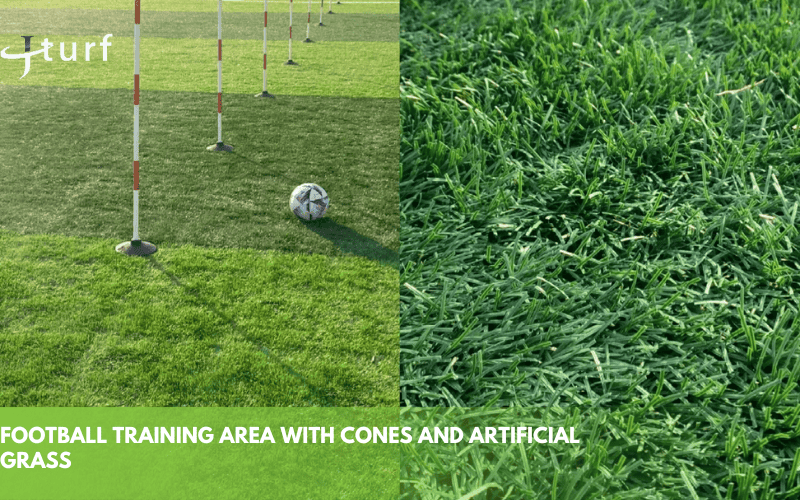
Economical Synthetic Grass for Football Fields
Budget-friendly artificial grass for football needs a 50mm pile height and 6000-8000 Dtex for cost-effective performance, costing $600,000-$800,000. Wrap-type turf (PE fibers, latex backing) is ideal, offering 60% shock absorption and a 6-year lifespan for 1,000 games annually. Its durability and low maintenance suit community or school fields prioritizing affordability without sacrificing quality.
Football Tournaments
The best artificial turf for football tournaments requires a 50mm pile height, 12000 Dtex, and rubber-cork infill for professional performance. Monofilament turf is recommended for its smooth 4-8m ball roll, 0.6-0.85m bounce, and 20% reduced injury risk. Its high durability (8-10 years) and traction support high-stakes matches, ideal for elite competitive fields.
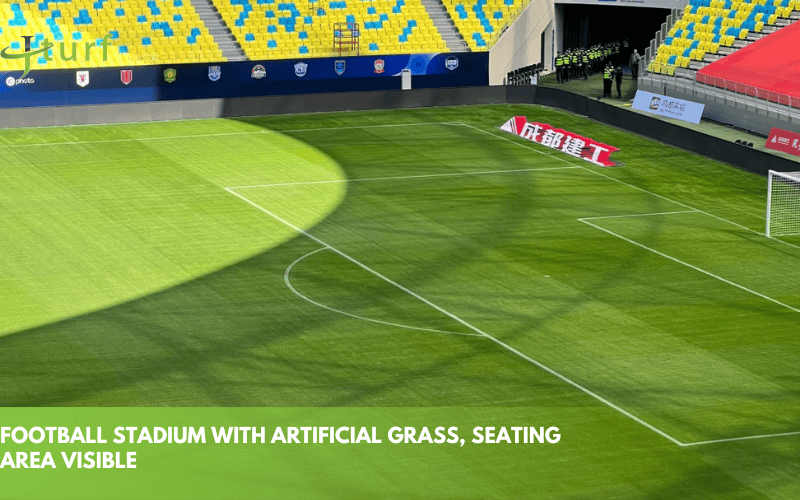
NFL/Super Bowl
For NFL fields, the top artificial grass for football needs a 50mm pile height, 14000 Dtex, and 70% shock absorption to cut injuries by 25%. Monofilament turf (PE fibers, 10mm padding) is ideal, ensuring 0.6-0.8 Nm traction and 8-10-year durability for elite play. Its consistent surface meets the demands of professional stadiums hosting high-impact games.
Regional Preferences
The best artificial grass for football varies by region.
- Europe requires monofilament turf (50mm, 8000-12000 Dtex) for durability and aesthetics.
- The U.S. favors monofilament with 70% shock absorption for professional play.
- Asia needs high-drainage turf (40 inches/hour) for monsoons, while South America opts for wrap-type turf (6000 Dtex) for cost efficiency. UV-resistant PE fibers ensure performance across climates.
Best Artificial Grass for Other Sports
The best artificial grass supports soccer, baseball, and multi-sport fields beyond football. Below, we detail their turf needs and compare soccer and baseball applications.
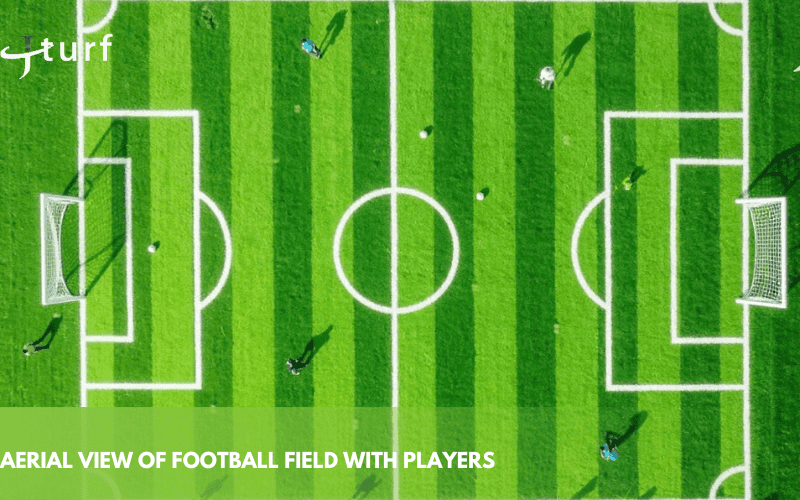
Soccer
The best artificial grass for soccer requires a 50mm pile height and 12000 Dtex for smooth ball roll (4-8m) and traction (0.6-0.8 Nm). Monofilament turf with rubber-cork infill is recommended for its 60-70% shock absorption, reducing injuries by 20% during competitive play. Its 8-10-year durability and UV-resistant PE fibers ensure consistent performance on professional and amateur pitches, supporting dynamic, high-intensity gameplay.
Baseball
The top artificial turf for baseball needs a short pile height (25-30mm) and sand infill for realistic ball bounce and infield stability. Short-pile turf (6000-8000 Dtex, PE fibers) is ideal, offering 8-year durability and low maintenance (weekly brushing). Its dense fibers provide consistent footing and minimal wear, ensuring reliable play on professional and recreational fields.
Multi-Sport Fields
The best synthetic grass for multi-sport fields requires a 50mm pile height and 12000-16000 Dtex to support football, soccer, and lacrosse. Non-filling turf (PE+PP fibers, 8mm padding) is recommended for its 65% shock absorption and infill-free design, simplifying upkeep. Its durability (6-8 years) and versatility suit school and community facilities hosting varied sports with high traffic.
Best turf for Soccer vs. Baseball
| Criteria | Soccer | Baseball |
| Best Turf Type | Monofilament Turf, Hybrid Turf | Hybrid Turf, Monofilament Turf |
| Pile Height | 40mm – 50mm | 40mm – 50mm |
| Shock Absorption | 70% – 75% (critical for injury prevention) | 60% – 70% (important for sliding and diving) |
| Infill | Sand-rubber or rubber-cork mix | Sand-rubber mix or rubber |
| Durability | 8-10 years (high traffic, wear resistance) | 6-8 years (resistant to cleat wear and sliding) |
| Performance Features | Good traction for quick turns and pivots | Provides stability for fast running, sliding |
| Common Field Usage | Professional leagues, recreational fields | Professional baseball fields, practice areas |
| Safety Considerations | Reduced ACL tears by 65% (Monofilament) | Reduced injury risk during sliding and diving |
| Weather Resistance | UV-resistant, suitable for various climates | UV-resistant, designed for harsh weather |
Can You Play Football on Artificial Grass?
Yes, the best artificial grass for football supports play with consistent traction for TF/AG cleats. All-weather usability saves 20% on maintenance vs. natural grass, but 10mm padding is needed to prevent turf burns, ensuring safe gameplay.
Which Football Teams Play on Artificial Turf?
- Seattle Seahawks (NFL)
- New England Patriots (NFL)
- Montreal Impact (MLS)
- Atlanta Falcons (NFL)
- Houston Dynamo (MLS)
Top Football Artificial Grass Manufacturer
JCturf is a global leader in the best artificial grass for football, operating advanced production workshops with tufting machines for PE, nylon, and PP fibers. Their 70m-long, 5m-wide automated baking line ensures efficient coating, curing, and packaging. Certified by CE, SGS, ISO9001, ISO14001, and OHSAS18001, JCturf offers FIFA-compliant turfs:
- S-Type Monofilament: 50mm, 8000-12000 Dtex, S-shaped for resilience and traction.
- Diamond-Type Monofilament: 50mm, 10000-14000 Dtex, ◆-shaped for durability.
- Non-Filling Turf: 25-50mm, PE+PP, 12000-16000 Dtex, for easy installation.
- U-Type Monofilament: 50mm, 7000-12000 Dtex, U-shaped for uprightness.
- Wrap-Type Turf: 50mm, 6000-14000 Dtex, yarn-woven for longevity.
Installed in 500+ fields, including FIFA U-20 World Cup venues, JCturf’s UV-resistant, eco-friendly turfs (6-8-year lifespan) meet stringent performance and safety standards.
